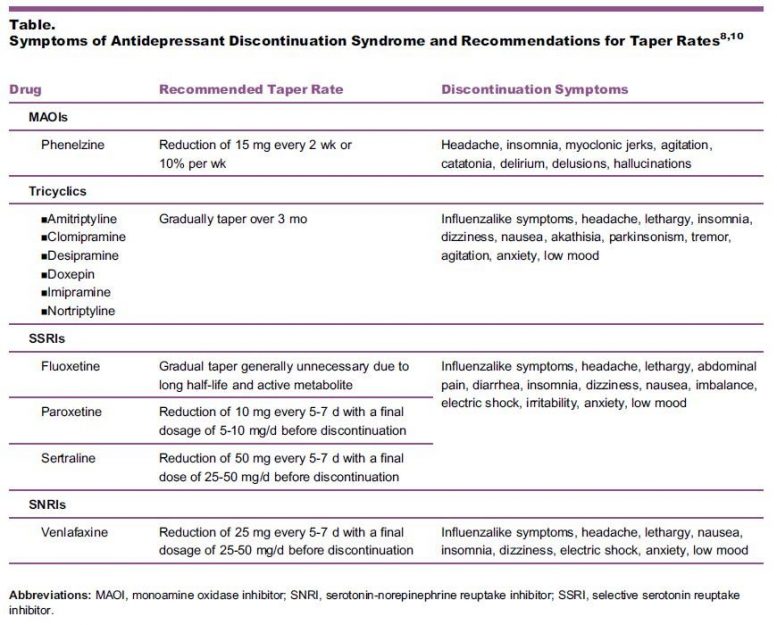
Patients who stop taking their medication often experience Antidepressant Discontinuation Syndrome (ADS), which includes flu-like symptoms, insomnia, nausea, imbalance, sensory disturbances often described as electric shocks or “brain zaps,” and hyperarousal.
Drug class ‘notoriously difficult to quit,’ yet not intended for permanent use, according to authors in The Journal of the American Osteopathic Association.
Patients who have taken antidepressants for years should consider coming off the medication. However, researchers say they will likely face difficult and even dangerous withdrawal symptoms due to a physical dependence.
“[T]hese are mind-altering drugs and were never intended as a permanent solution.” — Mireille Rizkalla
The best process is to follow a tapering schedule while consulting with a physician, according to research in The Journal of the American Osteopathic Association. Stopping medication outright is almost never advisable.
“I understand that many people feel safe in that their depression or anxiety is continuously managed by medication. However, these are mind-altering drugs and were never intended as a permanent solution,” says Mireille Rizkalla, Ph.D., Assistant Professor, Department of Clinical Integration at Midwestern University Chicago College of Osteopathic Medicine, and lead author on this research. “Once the patient’s depression or anxiety has been resolved, the physician should guide them toward discontinuation, while providing non-pharmacologic treatments to help them maintain their mental health.”

Researchers provide a schedule for gradually reducing dosage for each class and type of antidepressant, along with associated withdrawal symptoms for which patients and physicians should monitor. Credit: JAOA
Hard to quit
Patients who stop taking their medication often experience Antidepressant Discontinuation Syndrome (ADS), which includes flu-like symptoms, insomnia, nausea, imbalance, sensory disturbances often described as electric shocks or “brain zaps,” and hyperarousal.
Older, first-generation antidepressants often come with additional risks for more severe symptoms, including aggressiveness, catatonia, cognitive impairment, and psychosis. Discontinuing any antidepressant also carries a risk for gradual worsening or relapsing of depression and anxiety, as well as suicidal thoughts.
Indefinitely medicated
A recent report from the CDC said a quarter of people taking antidepressants had been using them for a decade or more. Rizkalla says this data makes the case that patients and physicians are overly reliant on medication without concern for long-term consequences.
“I think we have a real problem with patient care management, when it comes to prescribing antidepressants,” says Rizkalla. “We tend to put patients on an SSRI and more or less forget about them.”
She adds that, while relatively safe, antidepressants still carry side effects, including weight gain, sexual dysfunction and emotional numbing. She also urges caution as the evidence for antidepressant risk factors is based on short-term usage, and says there are no sufficient longitudinal studies on the neurologic impact of taking antidepressants for decades.
Rizkalla and her coauthors included the following tapering schedule for varying classes of antidepressants. However, she insists patients consult their physician before and throughout the process to monitor their symptoms and progress.









Yet again the stigma associated with mental health rears it’s head. No evidence submitted that there’s any known risk of taking anti-depressants in the long term so why is it singled out as being “bad”. I take cholesterol lower drugs on a permanent basis and these are known to stress the liver but I don’t see articles being written about them being bad. So what if I’m physically dependent on SSRI’s, what I know is if I stop taking them I become an anxious arse-hole. May family and friends bear the brunt on this so I’m sticking with my SSRI’s.
As someone that was on antidepressants for 2 years this is 100 percent true. I wish my doctor would have advised me to get off of them after 9 months. There are NO longterm studies after 9 months so there is no one on earth that has any idea the ramifications that longterm antidepressant use can have. Getting off of zoloft was a nightmare and my body still isn’t the same. Longterm antidepressant use is also shown to be a cause of Alzheimer’s & dementia later in life. Yes some people are so ill that they can never come off of the medication but for the rest they would rather take a pill than actively work on their mental health. People like quick fixes with minimal work.
Precipitously stopping certain short half-lived antidepressants, like venlafaxine, duloxetine or paroxetine, can be difficult. However, it is very easily done by adding fluoxetine for ten days while tapering down the other antidepressant. I am a psychiatrist, and over the years I have done this for scores of patients who had not been able to stop their antidepressants. This is not a phenomenon of habituation or dependence, and this article is mostly nonsense.